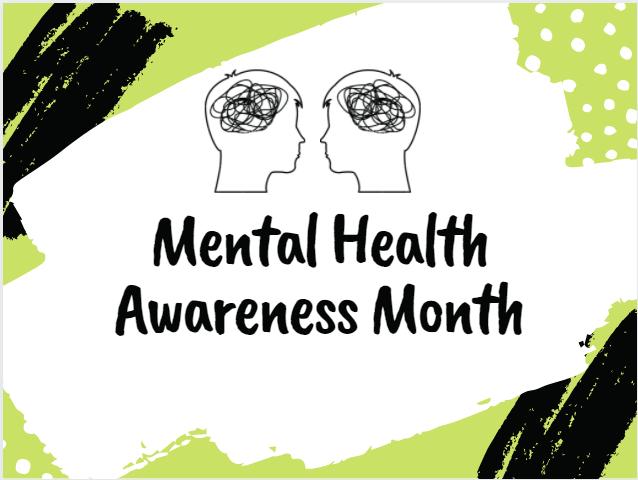Mental Health Awareness Month
April 30, 2021
Mental Health Awareness Month is upon us. But, what is the true meaning of this month, and why has it become so important to so many people over the last few years? The answer is simple. The number of mental illness cases is increasing, not only in the United States, but across the globe and it is time for us to begin recognizing that mental health and mental illnesses are not something to ignore, but something to acknowledge.
Mental Health America and those across the country began observing May as Mental Health Awareness Month is 1949 and have since reached so many people in their efforts to eliminate the stigma surrounding mental health. To show your support for those battling mental illnesses, their family members and friends, and others, show your support on social media, educate yourself, donate to mental health funds, and be sure to check in on yourself.
Take this month to think about those fighting everyday. Take this month to check in on your friends and family. And most importantly, Take this month to be aware of your own mental health.
Suicide Hotline:
800-273-8255
If you’re interested in a daily encouraging quote, click here.
Additionally, throughout this package, there will be polls about mental health. Here’s the first one:

Addressing common misconceptions about mental health and mental illness.
Mental Illness vs Mental Health
Especially during the pandemic, many people have been throwing around terms like “mental illness” and “mental health” without having an exact idea of what each of these terms mean, and the importance of a distinction between the two. Being able to differentiate between the two seemingly-similar ideas is crucial to understanding who we are and how we behave. So, let’s dive into important distinctions between the two.
To start, it’s crucial to understand what each of these words mean. The Center for Disease Control (CDC) defines mental illness as “conditions that affect a person’s thinking, feeling, mood or behavior” while it defines mental health as “ our emotional, psychological, and social well-being.” The main difference between the two is that mental illness is a diagnosable disorder which someone has, while everyone has mental health which they should strive to improve. Perhaps it’s simpler to understand by removing the word mental. Illness means specifically there is something wrong which diverges from your average healthy self. Health in general is simply your wellbeing. So, while everyone has mental health, not everyone has a mental illness.
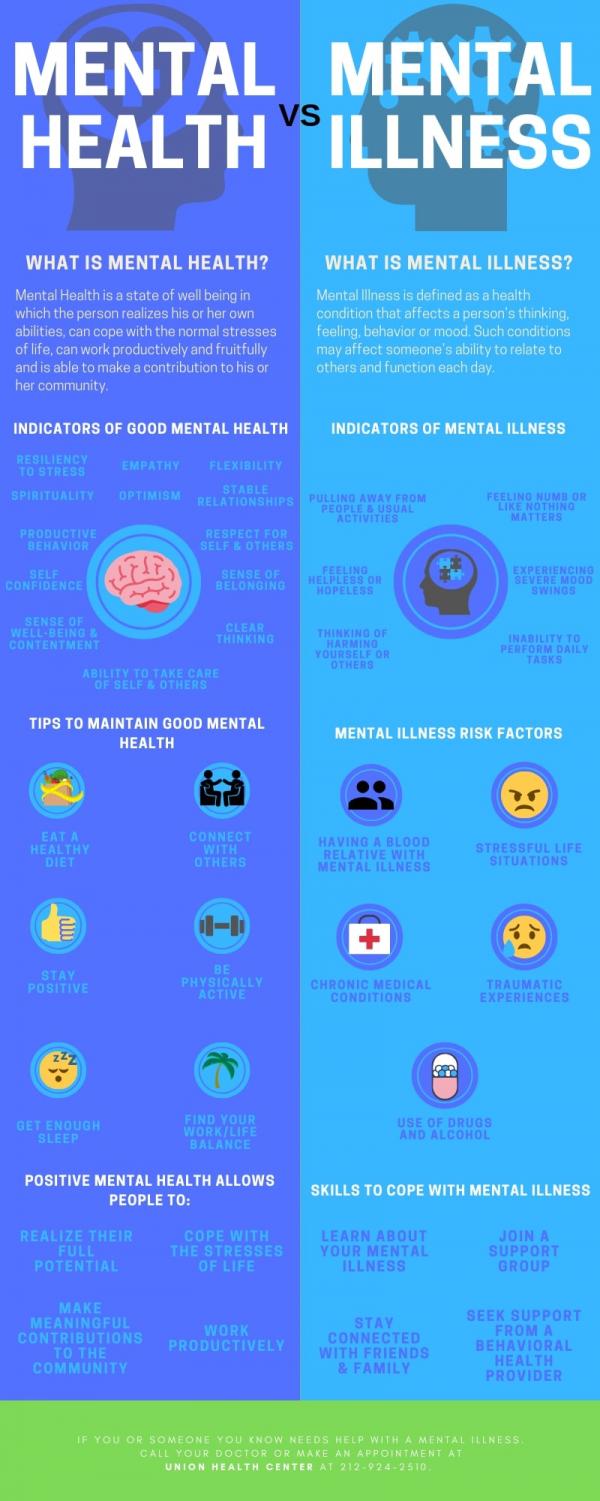
However, another important distinction between the two is that mental illness is more binary than mental health. In most cases, someone is either diagnosed with a mental illness or not. While the severity of the illness in it of itself is scalable (some people may suffer from severe depression or anxiety while others may have less severe forms of this), generally a diagnosis creates a binary where you either have it or you don’t. In mental health, because everyone has it, it is scalable. Some people may have very good mental health, while others may be struggling more. This is similar to physical health, where someone may be diagnosed with an illness (of varying severity), or may generally just be unwell (of poor health). Therefore, someone can be struggling with mental health, without specifically being diagnosed with a mental illness.
It is crucial to understand the essence of this because respecting the nature of mental health is crucial for respecting those who suffer. Just because someone is stressed, does not mean they have diagnosable anxiety. Just because someone is sad does not mean they have depression. While someone may be struggling, it does not equate to a diagnosable mental illness. Again, struggles with mental health must still be treated seriously, however out of respect for those who struggle with those illnesses, people should refrain from lightly tossing around phrases like “I’m depressed” or “ he’s anorexic” without greater understanding or context for what it actually means to say such phrases.
In general, it is crucial for everyone to take care of their mental health just as they do their physical health. Using the distinction between mental health and mental illness to minimize someone’s struggles with mental health must end as well. Just because someone does not have a diagnosable mental illness does not mean that they aren’t struggling. In general, greater understanding and respect for the differences between mental health and illness can lead to a more open society and a better environment for those struggling.
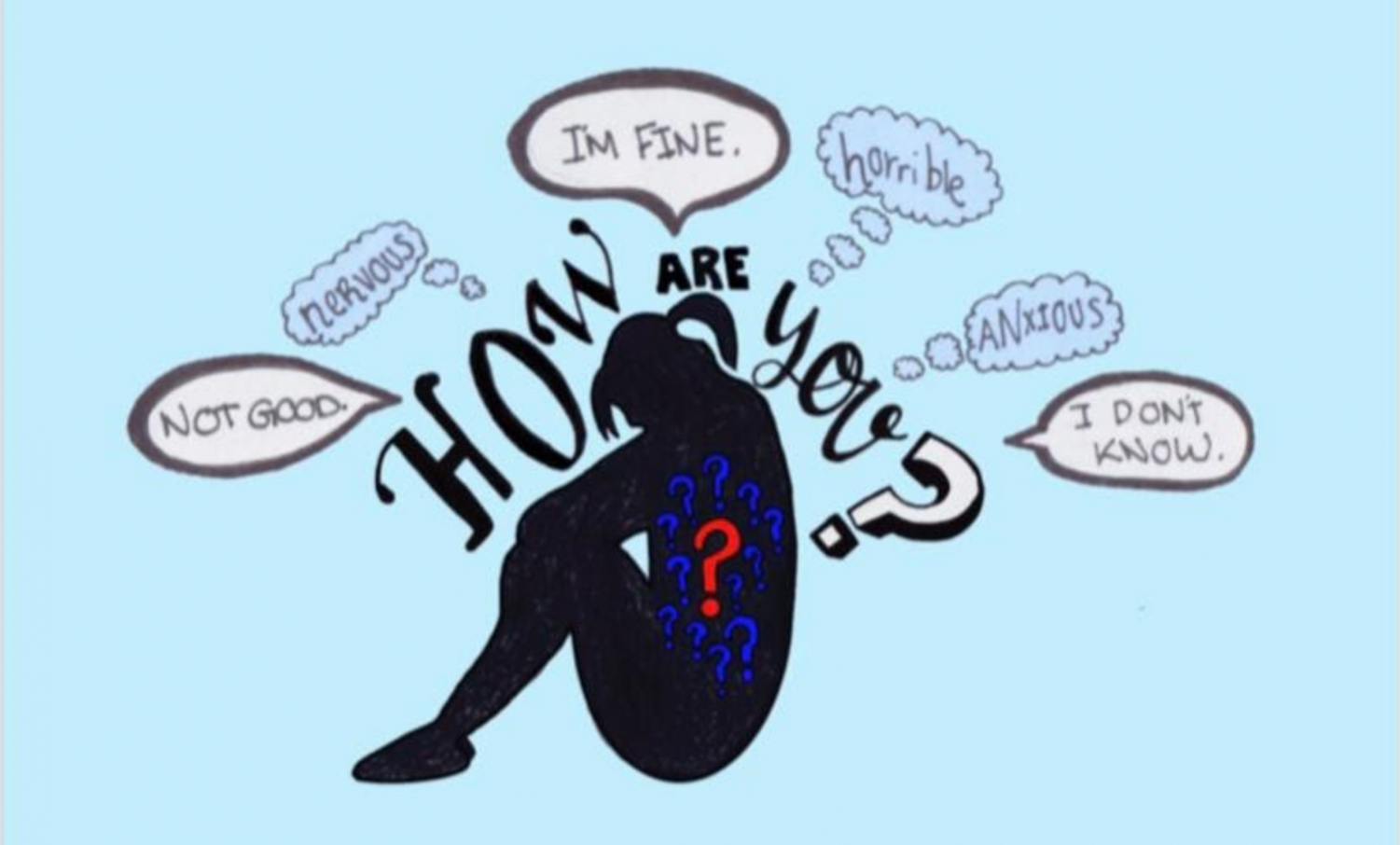
The perspectives of other East students.
Mental Health Perspectives
Name Given
My mental health has gone up and down with the past years. I have gone through many tough times. Through this, I’ve learned that in dealing with problems, it is important to look on the bright side. However, oftentimes my mental health is good. My mental health is especially good when I surround myself with good people along with keeping myself busy and focused.
– Jasmin Le (’23)
This year has been tough, with not being able to go places I would normally go and having to spend a lot of time at home with the same people. Days started to blend together, then weeks and months. It felt as though I was doing the same thing everyday and it grew difficult to find motivation in things I used to enjoy doing. I’ve learned to do things that allow me to take a break every once in a while, whether it was taking a walk or reading a book. I think that it’s important to realize that being happy is not an easy task, it is something you have to work for. I have had my fair share of metal health ups and downs in my life, but I try to grow everyday as a person to make my life a brighter place.
– Vivian Rong (’23)
I am currently a freshman, which is absolutely crazy to believe, considering that the last day that I actually attended school, I was in middle school. The COVID-19 pandemic is almost like a tunnel in terms of time, where you have no idea how long you’ve been in the tunnel or how much of the tunnel is left, merely because everything looks the same. There are some days where I feel like a song on loop, just doing the same things over and over again. My mental health, just like many others, has certainly been damaged. There was a point during the pandemic when I felt true boredom, as I realized that almost all stores were closed. While boredom does seem like a bad thing, it actually pushed me in the right direction. Feeling completely bored made me want to get as far away from that feeling as possible, so I started to attend extracurricular club and youth group meetings. Since then, I have become a part of many clubs, both in and out of East. I was amazed at how poor mental health can actually encourage you to better your mental health, under the right circumstances. To anyone reading this who is currently fighting their own battle with poor mental health, trust me when I say that things will get better, brighter days are ahead.
– Kyle Lehrfeld (’24)
Those Who Wish to Remain Anonymous
I think the biggest stress on my mental health has been the result of school and the pressure of “being good enough” and “being worthy.” I’ve always felt as though I am competing with people and with myself to prove myself worthy and good enough to get into a good college, to do well in sports, and have a good future. My parents never put a huge emphasis on this, but growing up in such a competitive environment and just never feeling good enough fostered this feeling. I find myself prioritizing school over my mental health, or feeling guilty for taking classes that aren’t as hard to prioritize my mental health. It really has decreased my mental health, but I know that this is a sentiment shared by a lot of students, so I find comfort in that. Another huge aspect that has affected my mental health is social media. It made me aware of insecurities I didn’t even know existed, and caused me to start to fall into the toxic ED culture. However, I was able to stop myself before I got too far in, and have a better relationship with food and my body. Especially being a POC without eurocentric features, it was hard to find people who looked like me who were praised and seen as “beautiful” by the media, and that really changed the way I looked at myself. Although social media has been pretty detrimental to my mental health, it does have its positive aspects. I’m working on using social media as a form of self expression and becoming more comfortable in my own skin. Something that is really helping me do this is self affirmations. At first, I did not believe that the positive things I said about myself were true, but as I continued to repeat these affirmations and make myself feel beautiful, I started to wholeheartedly believe them
I am so unbelievably stressed and tired all the time but I think I’ve internalized this overwhelming stress and exhaustion as normal. It’s now normal for me to get less than 6 hours of sleep, wake up early to finish homework, spend 6 hours or more each night doing homework, motivate myself with fear, and cry because I’m so stressed. None of these things faze me anymore. They’ve simply become part of my everyday life. However, after taking a step back and reevaluating, I don’t think it’s healthy to accept these habits as normal. So much of the work I do for school is done out of fear, not curiosity or passion for learning. When I’m doing my Spanish homework at 1 am, it’s not because I love Spanish or have a genuine interest in the language or culture. It’s because I’m scared of getting a 0 on the assignment, getting a B, dropping my class rank, ruining my GPA, not qualifying for Cum Laude, not getting into a good college, and ultimately not becoming successful or happy. All of these fears are what motivate me to do my homework way past midnight when I’m sleep-deprived and exhausted. These fears and speculations about my future and my life are the driving force behind my success and my grades. I’m not learning to retain information, enrich my mind, or become a knowledgeable person. I’m simply remembering stuff for tests and forgetting right after. This isn’t an ideal way to learn by any means but it’s the only one our school system offers for those who want to be successful. If I devoted all of my time, effort, and passion to every assignment, I would simply never get it all done. There is an unfortunate dichotomy between learning and success that forces you to choose one. Another part of my future that weighs heavily on my mental health is college. So much of what I do in high school is for the sole purpose of getting into a ‘good’ college. I overloaded my schedule with AP and Honors classes this year so my transcript will look competitive when I apply. It’s no longer enough to take all AP and Honors classes and receive all As. You need to take the most weighted classes you can get your hands on to show that you can handle rigor and take advantage of your opportunities. Part of my mind knows that no matter where I go to college, I can be successful and happy in life. But the other part of my mind desires pure validation. I’m pursuing acceptances to elite colleges simply so I’ll feel like these 4 years of high school weren’t a waste of effort, time, or stress. I want to feel like all my hardwork, sleepless nights, and hours spent studying actually contributed to something. I also want compensation for everything I’ve missed out on. I’ve sacrificed a lot of the ‘teenage experience’ for my grades and activities. I’ve never been to a high school party, gone to the city with my friends, skipped class or school, or even had a sleepover. I want to know that these missed experiences were worth something because the stress college gives me, even though I’m two years away, is so severe that I often stay awake at night worrying about it.
I was exposed to mental health problems at the beginning of my sixth grade year, and as I have grown up, the people I know with illnesses and struggling with their mental health has only increased. I feel as though at this point in time, everyone knows someone struggling, even if they are not aware of it. For me, I have struggled with anxiety and episodes of depression since elementary school, though I only came to realize it at the end of my middle school years. For me, depression is the worst, although I know that it is different for everyone. I fear everything all the time. It’s like a constant battle in my mind. Am I good enough? My friends don’t like me. I’m alone. I’m tired of constantly having to fight. I’m tired of knowing people who are struggling like me because we don’t deserve to struggle. In an environment like Cherry Hill East too, there is so much pressure from the school, parents and everyone compares themselves. As soon as you get out of class, people ask how you did or what the questions were. And then a week later, people are asking you your grade. If you don’t answer, people assume you did poorly, but why should I have to share my grade with you? Society is making things so much more difficult now. For me, the anxiety is constant. The episodes of depression come and go, but it is easier for me to identify when they are coming now. I am still working on accepting my own struggles and I am still working on accepting that I know people who struggle, same as me. What I do know right now though, is that I do have people there to support me. It just took me a long time to realize it.
Growing up I always struggled with self image issues. Especially being an Asian, there was always a specific way to look and I did not fit that category. With that, I was constantly worried about my weight, how I looked, and compared myself to others. As I grew older, I learned about eating disorder illnesses and was very tempted to give in. Luckily, I did not and instead worked to become more fit and healthy rather than skinny and sick. That experience alone had opened my eyes to the society we live in. We live in a world that tries to harm us by normalizing the “perfect body”. I’ve seen girls all over social media platforms commenting on others posts saying things like “time to starve myself” or “going to go purge now” and they get tons of likes and replies that agree with them. That in itself should be so alarming. Thankfully I’ve never fallen into any of those deep mindsets, but eating disorders and body dysmorphia should be further highlighted and talked about, rather than be something that is praised and made into a joke.
I think I’ve been extremely lucky in the area of mental health because I’ve been largely this year while many of my friends and classmates have struggled greatly. I had a serious sports injury this year and two reconstructive knee surgeries so most of my struggles with mental health and happiness are related to my fear that I won’t be able to play field hockey next year. I don’t really know how I’m managing with school this year because I feel like I should be a lot more stressed, sad, and anxious than I am. I think I’m kind of numb to all the stress and pressure now because it doesn’t affect me as strongly as it did last year. One thing I’ve noticed is that I have a weird sense of anxiety on weekends, even though I know I’m supposed to be relaxing and recharging for the upcoming school week. All I can do is think about all the work I have due soon and how I can possibly finish it all. It’s kind of a never ending struggle. At this point, I’m just blindly pushing through school day by day and holding out until summer.
Ever since middle school, I have struggled with self image. I always saw myself as the “biggest” in the friend group. I could never find clothes that I felt confident in or fit me right. I felt the most comfortable in sweatshirts because they hid my figure. I always looked in the mirror and didn’t like what I saw. I always felt that people were judging my every move. I got caught up in caring what people thought about me. I used to exercise or run on the treadmill for the sole reason of losing weight. I am still on the journey of fully embracing who I am. But now I realize that my body does so much for me and deserves to be taken care of.
Personally, it changes multiple times everyday according to the events occurring as time goes on. I get stressed easily, especially if I get a sudden rush of assignments and activities I have to complete. On most days (on a scale From 1-10 1 being the worst) I would say I’m just staying around 3-5. A lot of things play into that such as sleep deprivation, overwhelming school work/outside of school work, pressure, parents, etc. Although I only had a couple huge breakdowns, I would say I’m in a pretty stable but uncomfortable place; just very stressed all the time and tired.
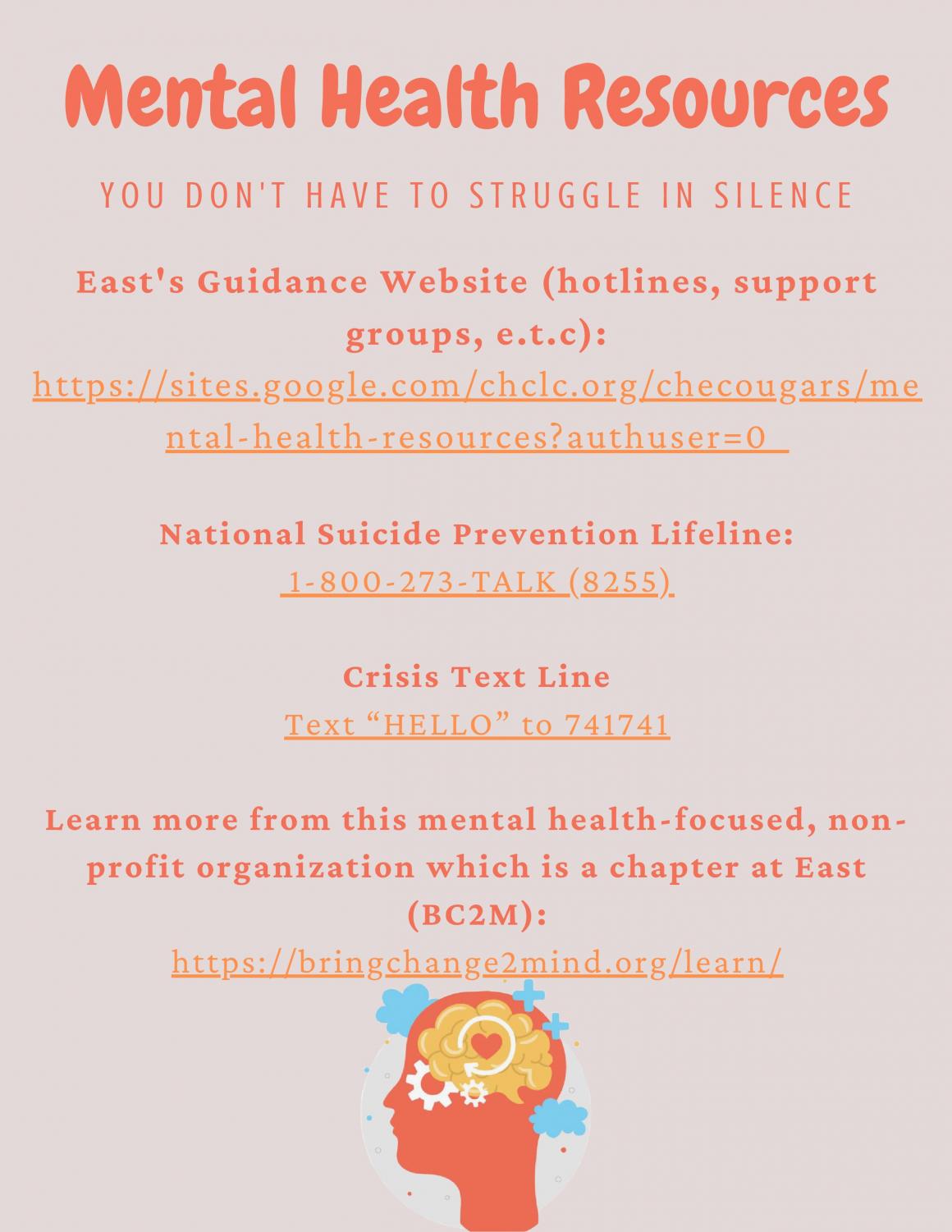
I don’t think I’m as severe as some other individuals, and I’m grateful for that, but as somebody who has lived their lives thinking that they were the mentally stable one out of their group of friends, I quickly found that was wrong sometime last year. I’ve had no motivation and I hate myself for being that way and I constantly stress myself over work, but I can’t bring myself to do my work any earlier. I’m also not getting enough sleep, which doesn’t help with any intrusive thoughts that I may have.
I’ve had a lot of ups and downs with my mental health. Partly from school, partly from my family. I have struggled a lot with my home life and stuff that happened but most of it is in the past. When I get too stressed or don’t get enough sleep it resurfaces. Other than that I tend to have problems with perfectionism and never being enough :/ if I accomplish something that’s expected and I’m never content.
Depression feels like a constant headache. I feel nothing and everything at the same time. I can’t keep track of the days because everything around me is just white noise. Everyday I don’t do my best and I know I’m not doing my best but sometimes I’m so stuck that I can’t do anything about it. Schools aren’t built to handle mental illness even though it’s a factory for it.
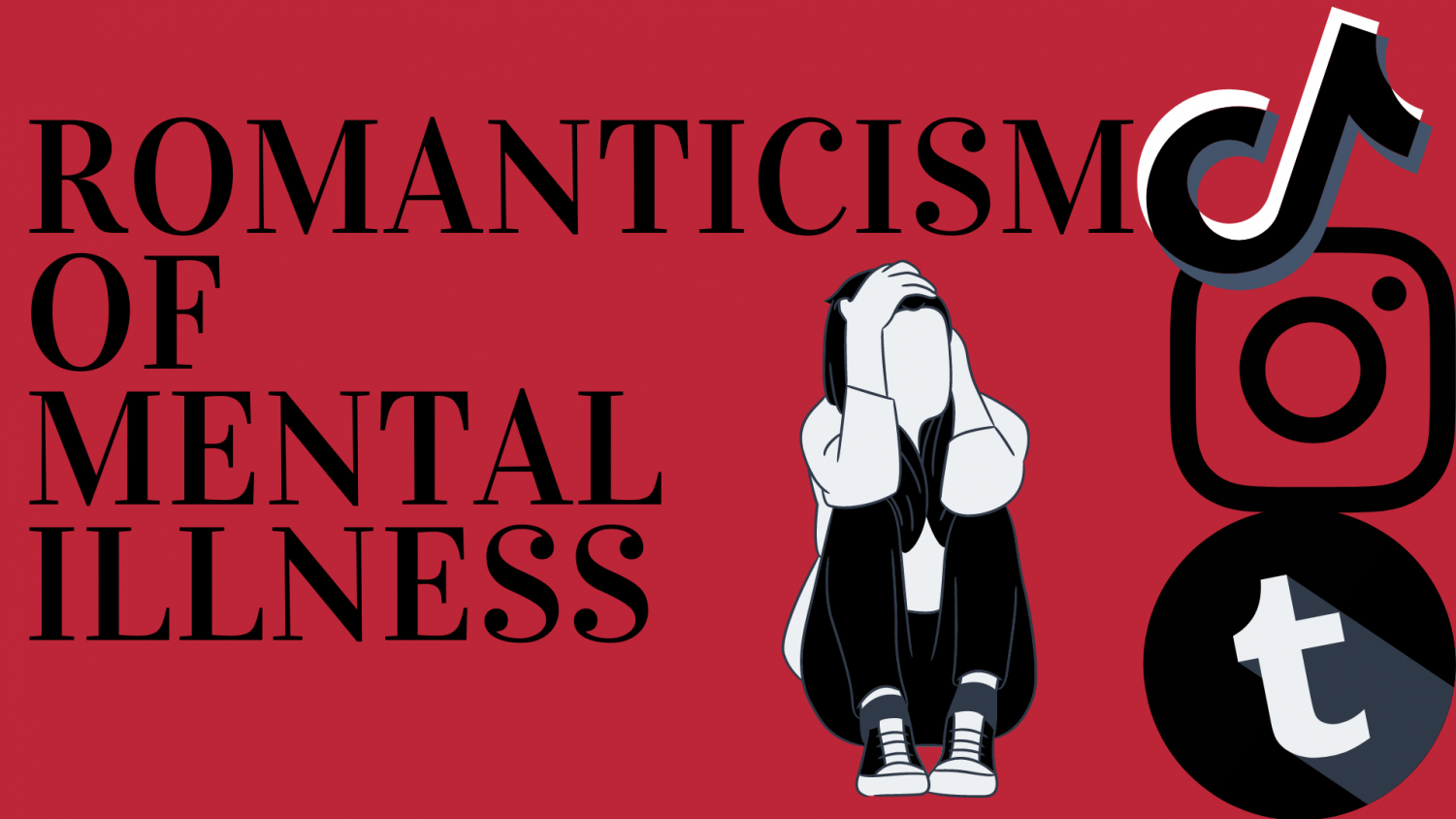
Recent social media trends have ‘romanticized’ mental health and mental illnesses.
Romanticizing Mental Health
Growing up with a mental illness is a blessing and a curse. As the saying goes, “too much of anything can be bad,” and the same philosophy applies to mental illness. I am diagnosed with ADHD, anxiety, and OCD, which stems from anxiety and depression. I have been going to a therapist for almost 8 years now, and I am medicated. Many people may now be wondering, “Why is she telling us this? Does she want us to feel bad for her?” And the answer is no. However, I do recommend reading on, this is just the beginning.
As Newton says, “with every action, there’s an equal and opposite reaction.” In my opinion, Newton’s 3rd Law applies to more than just energy and physics but with life in general. I believe blessings and curses can relate to this theory as well as when we realize something that can help us, can also hurt us. For example, if you are active you may be in great shape, however, you may also be putting your body under a lot of stress. The same principle applies to mental illness; my ADHD allows me to be alert and attentive, however, if there is more than one thing going on around me, my attention gets shared and it becomes hard for me to focus on the important task at hand. Additionally, my anxiety keeps me safe from doing stuff that could hurt me in the long run, but it often prevents me from enjoying the moment by flooding my brain with all the possible negative “what ifs” that could occur, and thus, causing me to miss out on much of the pleasure others around me seem to be experiencing. My OCD allows me to make sure I do my best work and give my best effort, but it also makes my daily tasks much harder in fear that something bad would happen if I do not hit a button 3 times, and it issues a fear of failure that has also complicated simple-seeming tasks, which hold me back multiple times. And finally, my depression. It is hard to see a blessing that comes from depression because the curses truly outweigh them. However, one blessing I have grown to understand is my ability to connect with people when they are having a rough day. It makes me more empathetic to others and allows me to understand the darker sides of the world. It does make me numb most of the time, but those small moments when I can feel things and relate to others and help them are beautiful. As beautiful as those moments are to experience, I would sacrifice them for a chance to wake up every day and look forward to life without the burden of mental illness. And, yet, I appreciate that my challenges have helped shape who I am by defining my character as someone proud of the obstacles I have overcome and willing to continue to learn from those I have not yet mastered. I can’t imagine a life without them. Everyone faces challenges. These are mine.
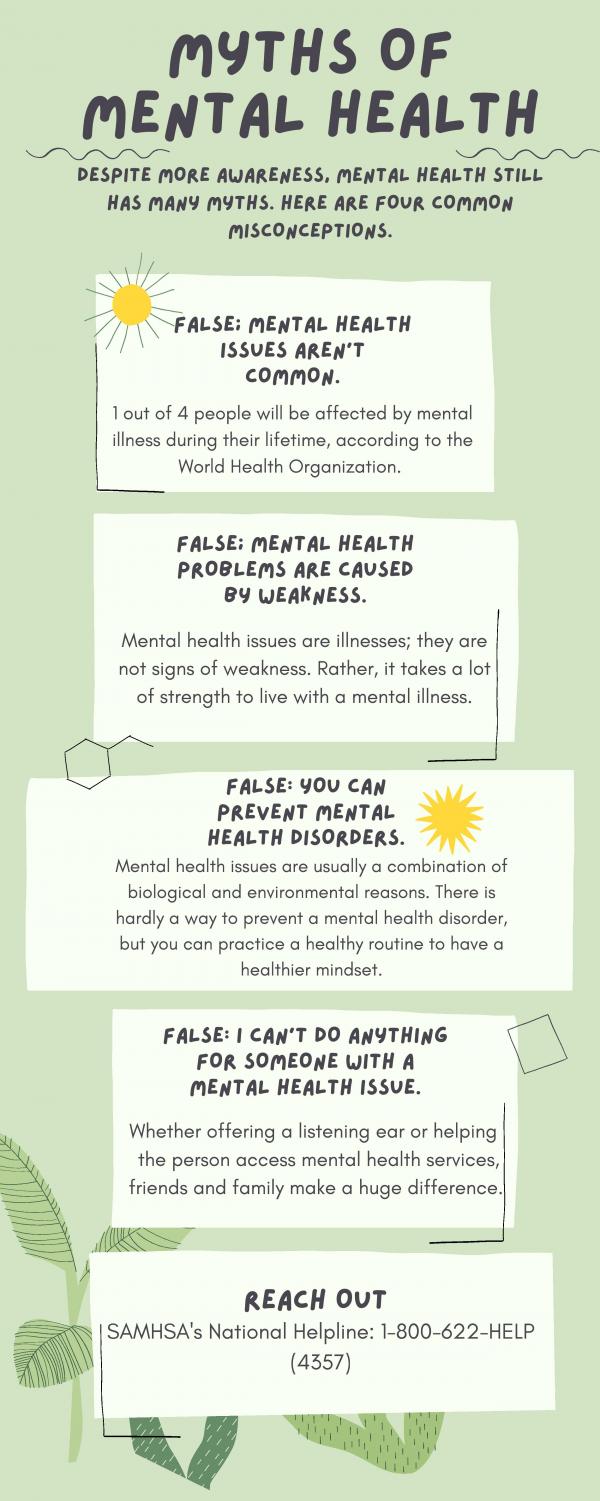
So the reason I am writing this article is to change the stigma around mental health. In today’s world, there are so many opinions surrounding the topic of mental health. Through the use of social media, I find that these illnesses and struggles are often either dismissed or romanticized.
On social media sites, such as Instagram, Tumblr, and TikTok, many people are making it seem like it is “cool” and “quirky” to have a mental illness. It romanticizes it through memes and making it sound like it is “tragically beautiful.” Although jokes are a way to handle trauma, the number of people using them and trying to make these serious illnesses seem like stuff to be grateful for because it makes you “unique” is extremely harmful. It not only lies about what mental illness is all about, but it invalidates people’s feelings and experiences. It allows for people who are experiencing the natural levels of worry and sadness that comes with being human and experiencing life’s challenges to feel that they have a mental illness when they do not. Again, back to the blessings and curses, it may allow for some people to realize they do have a problem but for the majority, it puts a false reality into their mind and therefore takes away the significance that these illnesses cause others. By normalizing mental illness in a way that seems to be a “cool” thing, it diminishes the impact and effect it has on those who struggle with it.
When these illnesses are being romanticized on social media they only project the way in which we all think mental illness behaves. For example, people romanticize depression by saying, “what a mood to just cry,” when in reality most people with depression do not cry often (including myself), in fact, more often than not, people with depression just feel numb. When they discuss OCD as an aesthetic and say, “I need everything to be nicely put away so it looks cute.” When in reality OCD is more than perfection. It is about doing something over and over again until it feels right, or the fear that if you don’t touch a computer key three times, you will feel awful and something bad will happen. Not everyone with OCD presents as an organized neatnik as evidenced by the state of my room, closet, drawers, and etc.
In conclusion, by making it seem like everyone struggles with a mental illness, you lose the weight and importance of it. If it seems “normal” no one will care to fix it. Therefore, it is important that when you discuss mental health you know what you are saying and are not using stereotypes or diminishing the challenges people who live with mental illness face everyday. Finally, I want to make it clear that because you have a mental illness does not mean you are weak. You are struggling and there is nothing wrong with that. By struggling, it proves that your body is still fighting, and as you fight you become strong.
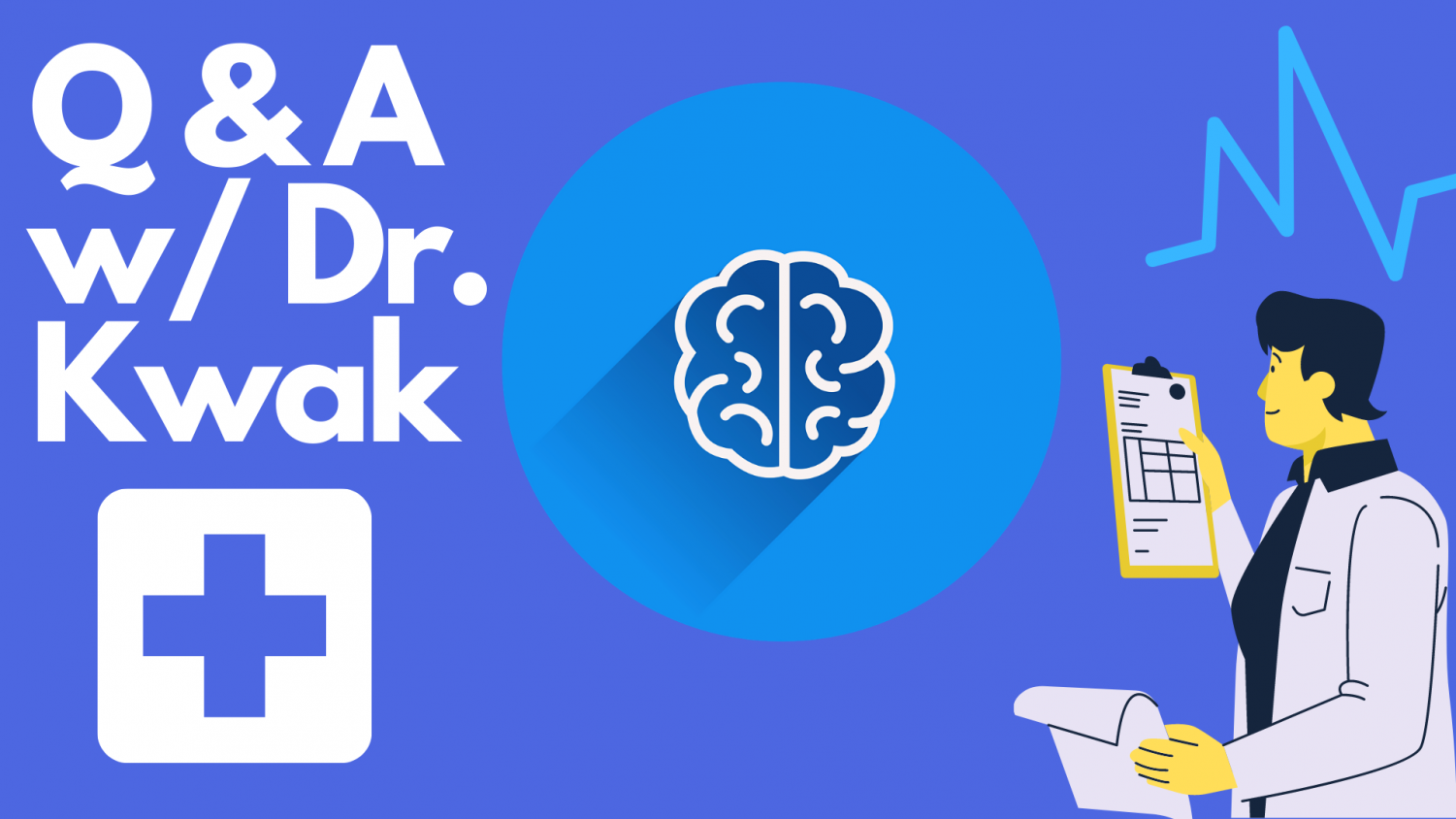
Family physician, Dr. Kwak, answers questions regarding mental health.
Interview with family physician about mental health
Dr. Kwak is a board-certified family physician based in Voorhees. He works with families to manage and diagnose a variety of adolescent and adulthood medical problems.
Q: As we approach May or Mental Health Awareness Month, more people are shedding light on issues regarding mental health. What does mental health mean to you?
A: I would say that mental health means general health. Your overall health depends on your mental health as well. As you grow up, you’re going to face a lot of challenges, and I guarantee you some of those are going to deal with mental health, especially in college.
Q: What kind of effects does mental health have on physical health?
A: Mental health is intertwined with physical health. If your mental health is good, then your physical health can only benefit as a result. That’s not to say that if you’re mentally healthy, you’re going to be physically healthy. However, you’re more likely to be physically in shape if you’re mentally in shape. And it works both ways, so if you’re mentally unhealthy, then it’s going to have a physical toll on your body. Say, for example, if you or someone else is going through depression, then you can easily lose your appetite, have trouble sleeping, [and] not want to move or exercise. All of those things can negatively impact your physical health.
Q: What are some of the basics to staying mentally healthy?
A: I think one of the basics is going to sleep on time. Sleeping at 1 AM and getting up at 6 or 7 AM is extremely unhealthy both physically and mentally. So getting enough sleep is fundamental for your mental health. Other things are eating healthy foods and drinking enough water. Simple things, like exercising on a regular basis. Even with Covid-19 around, people still need to go outside and get out of their homes. Staying inside your home and being in front of the computer screen isn’t good for you at all. So have enough rest, eat good foods, and exercise. Also, talk to your friends and family about the things that you’re going through. It’s important to be open.
Q: What are some ways to deal with stress?
A: The ways I help my patients deal with stress depend from person to person because everyone’s condition and treatment will be different. So it’s difficult to give a straight answer, but some general things would be, like I said, exercise. My favorite exercise is Kendo, which helps me relieve my own stress. Other things like meditation; affirmations; relaxation, like a massage or a bath; [and] therapy help as well, but, again, it’s different for everyone.
Q: What’s your advice for people who are afraid or too embarrassed to ask for help?
A: No one should ever be embarrassed. Taking care of your health should always be a priority. But I can understand if some people don’t want to immediately open up about their issues. A lot of it is private and personal, and it’s going to be hard for people to ask for help. Now I don’t know the exact reasons why a person would be afraid. But the sooner that they talk to their guardian or parent or friend, the quicker they get the help they need.
Q: Have you noticed any effect that Covid-19 has on people mentally?
A: Yes, definitely. We all know how Covid-19 has hurt people physically, but it’s also hurt people mentally either directly or indirectly. Some people are having problems with their mental health because everyone’s at home, and they’re not socializing as much as they used to. To remain socially isolated from others for one year will obviously hurt a person’s mental health.
What the school can do differently
Today’s society can be a cruel and painful place, leaving damaging impacts on so many people’s mental health. It is important to know, however, that nobody is alone — ever. If you look around you, there are people who will be there to support you, even if you cannot believe it yourself. It is true that you may be lonely, but alone, you will never be.
At Cherry Hill East, there are certainly resources offered to students, though many people are not aware of these resources. Most of these resources can be found on the Cherry Hill East’s guidance website which includes hotlines, student outreach networks, counseling recommendations, and more . Though these resources can of course, be a help to many students, in the future, there are so many opportunities for the East community to reach out to their students in a more direct way.
For example, teachers are the adults whom the students often see the most, and want to trust the most, but in many instances, students do not feel that they can open up with their teachers. As teenage students, the pressures of academics, social interactions, and many other instances can cause feelings of excessive worry and sadness. When one wants to reach out to a teacher, sometimes a student may feel as if the teacher will view them as a complainer. They may feel as if the teacher will not understand, and will not want to help with whatever the student may be struggling with. This problem however, can easily be resolved. Check-In’s, a google form where teachers can reach out to their students and assess their feelings, has proven to be an effective way for teachers to not only build relationships with their students, but to also connect with students and be a direct line of communication enabling students to feel comfortable sharing their struggles with their teachers.
Asking for help still seems to be a difficult task for people of all ages to do, especially teenage students who are already struggling with finding who they are, and trying to find their crowd in a high school, that seems more like a bustling city. Unfortunately, as difficult as it may be, it will also often require the administrators, teachers, and staff to reach out to students, because chances are, the students will not feel comfortable doing it on their own, and these Check-In’s can be a fast and efficient way for teachers to gage how their students are doing.
Certainly, even with Cherry Hill East staff reaching out to students, some will still feel as if they can not ask for help and open up to the school, which is understandable in the pressure induced environment. This is where the school resources must prove to be effective, however. Making daily announcements and directing teachers to share the resources with their students will hopefully lead the students down the right path. The guidance website, as previously pointed out, is not a resource most students are aware of, and must be publicized more frequently, and in places where all students in every corner of Cherry Hill East, can find.
Additionally, when in school, the guidance office has pamphlets that sit on a rack, visible to everyone when they walk in. While this may seem to be a great thing for students, it also proves to be inefficient. Those who are struggling and who can not open up to teachers, will most likely not feel comfortable taking a pamphlet in front of everyone sitting in the lobby of the guidance office. These pamphlets however, can be an amazing resource for students, so there must be a solution found to actually get these pamphlets into students hands, and there is. By putting these pamphlets in the guidance counselors’ individual offices, students will feel more inclined to take a pamphlet because as opposed to their peers watching them, there will only be one adult watching them, who is there to offer help.
It cannot be ignored however, that the guidance department and the Cherry Hill East school is already taking steps to reach out to their students in providing Behavioral Screening (Behavioral Health Works). This initiative was put on hold last year due to the outbreak of COVID-19, but it is finally being reintroduced for the students at Cherry Hill East, and is a promising way for students to evaluate their mental health and all results are kept private from student’s teachers.
Mental health is affecting students in profound ways that many could have never predicted, but it is happening, and as a community, it is important that we all are there to support those struggling. It is mental health awareness month — a month focused on recognizing those who struggle with mental illnesses everyday and their mental health everyday. It is a month where communities, nations, and the world must come together to understand that mental health is just as important as physical health, and those struggling are deserving of care, acceptance, and understanding. Please take the time this month to acknowledge those who are fighting for their mental health.
